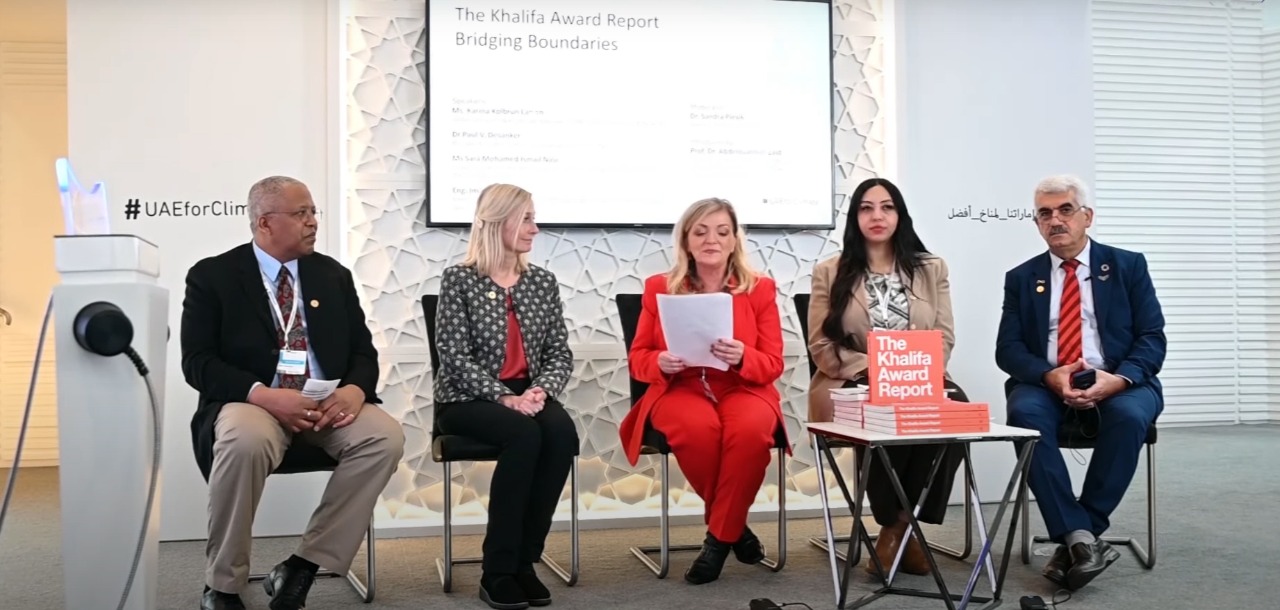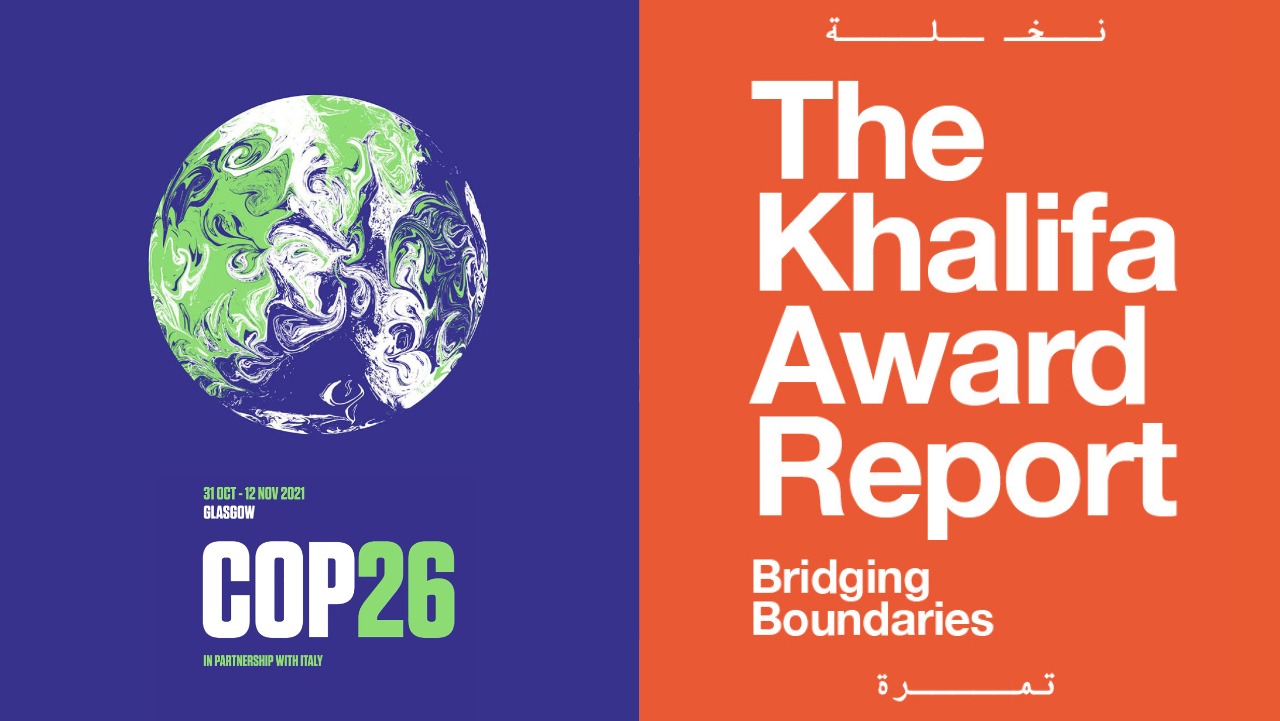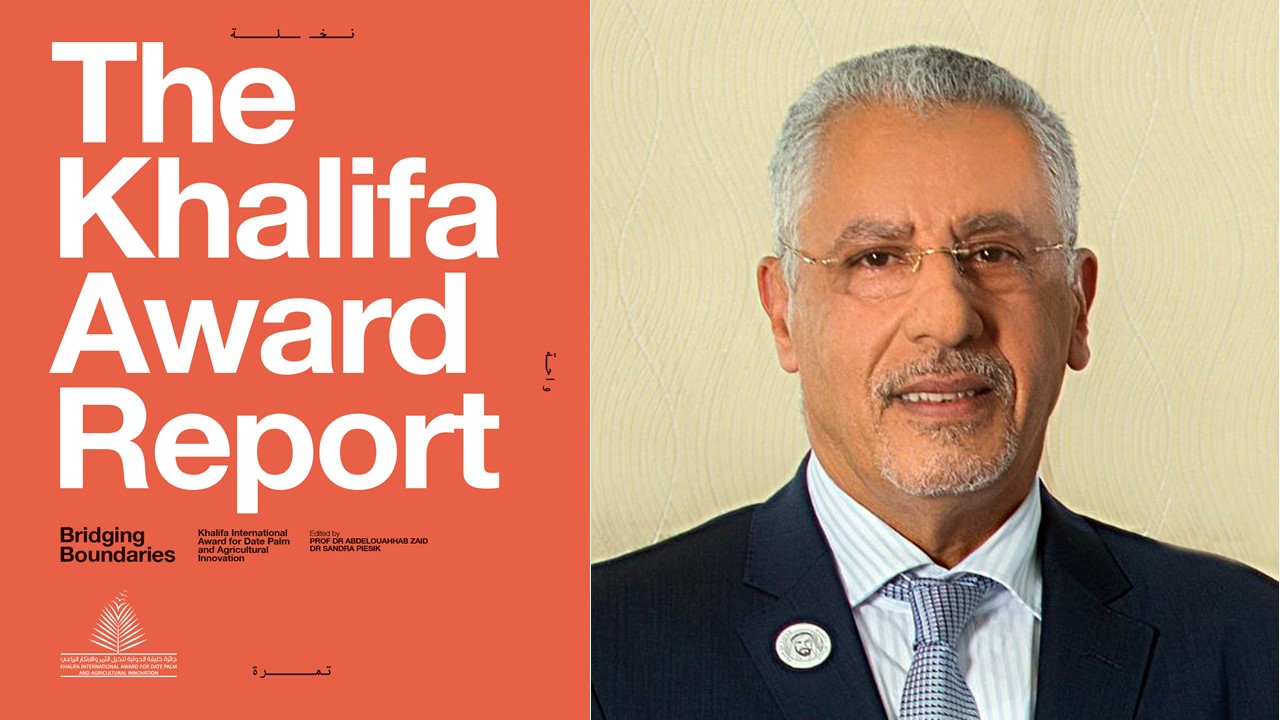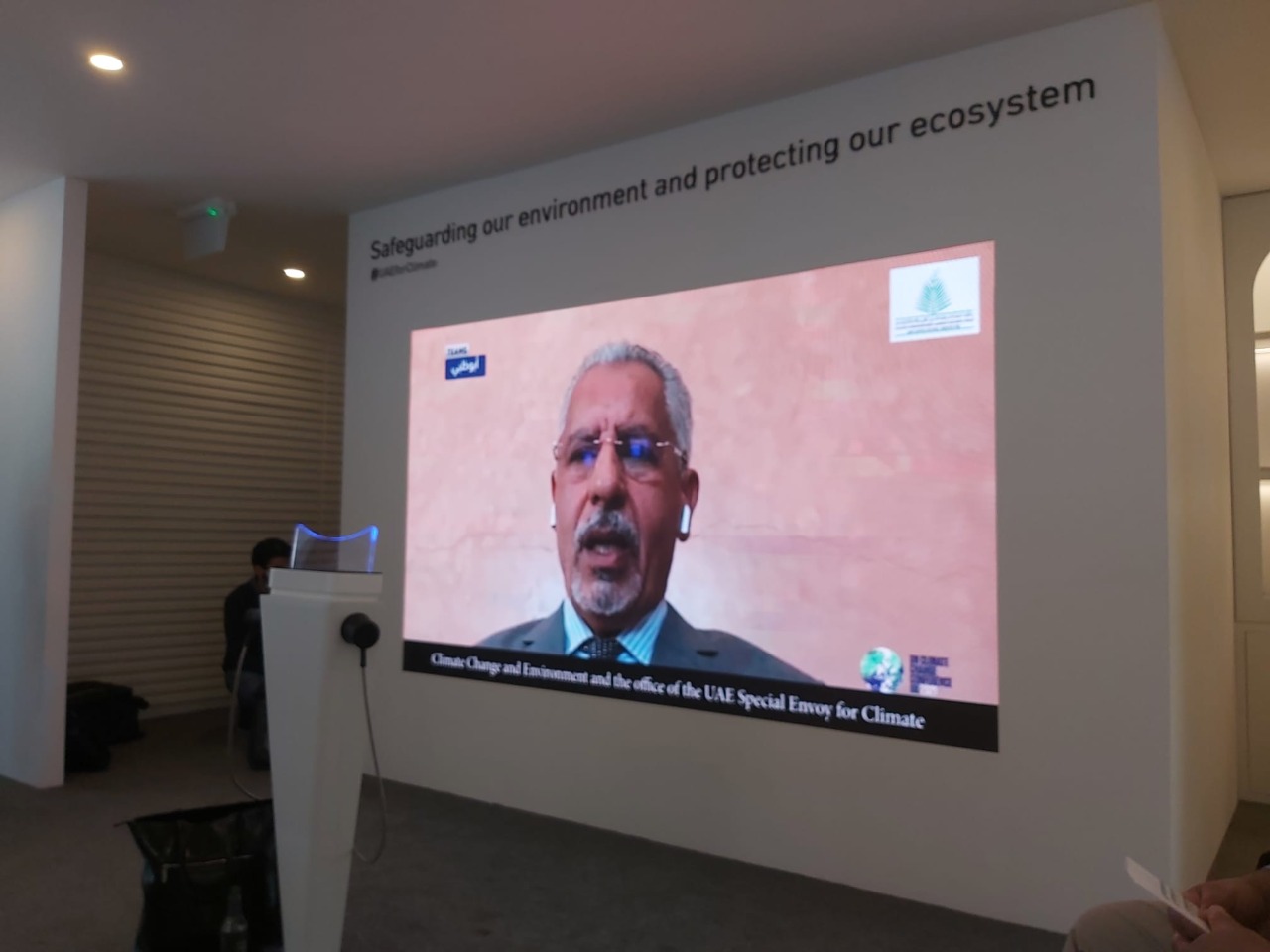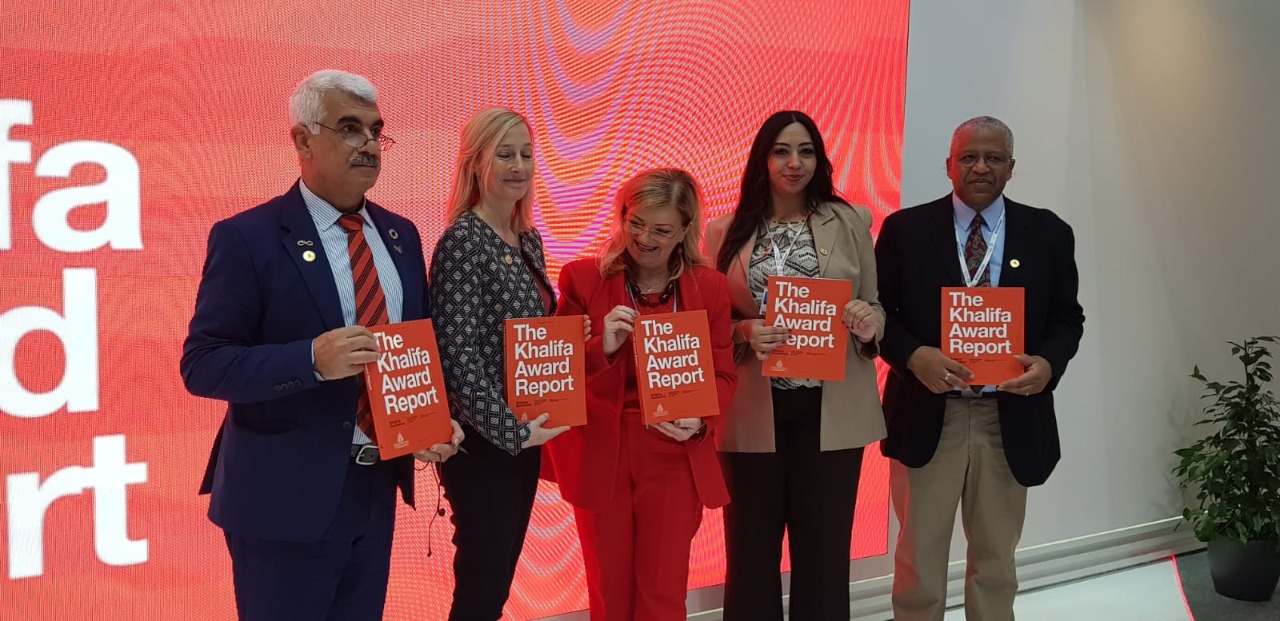- International News
- Sun-2021-11-07 | 10:32 pm
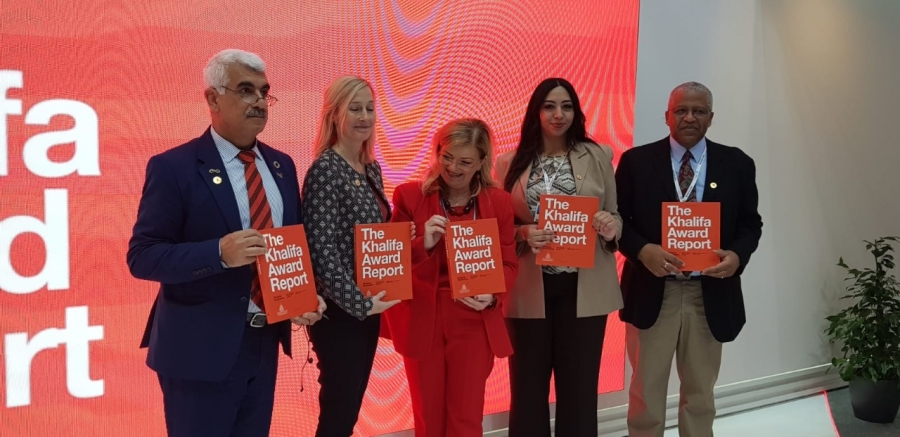
Nayrouz News Agency :
Khalifa International Award for Date Palm and Agricultural Innovation launches the "Bridging Boundaries” report, at the Climate Change conference, Glasgow.
Conservation of date palms is the key to a sustainable world
Khalifa International Award for Date Palm and Agricultural Innovation, through the UAE pavilion, launched a scientific report entitled "Bridging Boundaries”, as part of its participation in the 26th Conference of the Parties (COP26), under the United Nations Convention on Climate Change, taking place at Glasgow, Scotland, from the 31st of October up to the 12th of November, 2021. This participation comes under the directives of H.E. Sheikh Nahayan Mabarak Al Nahayan, Minister of Tolerance and Coexistence, Chairman of the Award’s Board of Trustees, on Saturday, 06th of November, 2021, in the presence of the Award’s delegation, Dr. Sandra Piesik, Director of 3 Ideas B.V., Dr. Paul Desanker, Manager, Responsive Subdivision, Adaptation Division, UNFCCC, and Ms Karina Kolbrun Larsen, Global Operations & Knowledge Manager of the Climate Technology Centre Network (CTCN). Where the report focused on how vital regional cooperation can transform the date palm industry into a successful circular economy model, in parallel with the United Nations Ecosystem Restoration Decade (2021-2030). The report pointed out the importance of the date palm tree, as it is considered a key to a more sustainable future, as it represents an added value in absorbing carbon dioxide, and in return reducing the negative effects of climate change. The report was prepared with the contribution of 46 international organizations and experts, representing 21 countries from around the world.
On this occasion, Dr. Abdelouahhab Zaid, Award’s Secretary General, highlighted the fact that this report will provide a framework for addressing key climate change problems such as: carbon dioxide emissions, biodiversity, desertification, drought and land degradation, where the date palm tree is considered to be the heart of the climatic revolution. The report is framed within five main axes: People, Planet, Prosperity, Peace, and Partnerships, which constitutes the 2030 Agenda for Sustainable Development, approved by the United Nations. The report is a call for action by management bodies and industry leaders to recognize the importance of the date palm tree, especially in the Middle East and North Africa region, using it as a starting point to bring about positive change for both people and planet, across many sectors, to achieve the following objectives:
People: Scale up the restoration of date palm ecosystems to alleviate poverty, to ensure food security and to see date palm as a holistic developmental solution
Planet: Implement transboundary adaptation programs focused on date palm oasis restoration, to enhance its full environmental, economic, and social potential
Prosperity: Focus on new jobs across all sectors with a diversity of skills from manual labor, to intermediate technology to the Fourth Industrial Revolution. This will help to ensure that all human beings can enjoy prosperous and fulfilling lives and that economic, social, and technological progress occurs in harmony with nature
Peace: Use climate action, the UNFCCC system, Agenda 2030, and other global frameworks to scale up oases’ restoration, prevent degradation and foster sustainable urbanization for regional security
Partnership: Create an enabling environment for new policies at the regional, national and local government levels for the implementation of SDG 11.A to "Support positive economic, social and environmental links between urban, peri-urban and rural areas by strengthening national and regional development planning”.
46 contributors have inspired the report across 21 countries, including adaptation experts such as Dr Youssef Nassef, Director of Adaptation Program UNFCCC. It provides a framework to tackle the major climate change issues: CO2 emissions, biodiversity, desertification, drought and land degradation, with date palm at the very heart of the climate revolution.
One of the report’s co-editors, Dr. Abdelouahhab Zaid, FAO Goodwill Ambassador in UAE, and Secretary General of the Khalifa International Award for Date Palm and Agricultural Innovation said: "It may not be widely recognized yet, but date palm is essential to sustainable living. Through the conservation and growth of date palm trees, we can overcome environmental, societal and economic challenges. As mentioned in the report, each date palm tree can absorb around 200 kilograms of CO2 per year. This means that the 100 million trees in the MENA region have the capacity to absorb around 28.7 megatons of CO2 per year.
"This ground-breaking report offers us the opportunity to reboot our society and economies with more than just a glimmer of hope.”
Dr Sandra Piesik, who co-edited the report alongside Dr. Zaid, reflected on the post-pandemic Green Recovery opportunities: "The COVID-19 pandemic has exposed unresolved pre-pandemic challenges involving the national food security of individual countries during national lockdowns. Therefore, the pursuit of a self-sustainable developmental model serves both planetary and human health.
"To achieve this, North-South, South-South and triangular regional and international cooperation will be crucial, in line with SDG 17, which aims to enhance international cooperation when implementing sustainable initiatives. As a result, we urge governing bodies and industry leaders across the world to read the report, work together and take the appropriate action. It will save lives, livelihoods and fundamentally, our planet.”
Due to their genetic diversity, date palms are resistant to extreme weather conditions such as heat, drought and floods, which can lead to reduced harvest yields and the deterioration of natural resources, particularly in lower income countries. When sustainably managed, date palm ecosystems are vital in reversing desertification in desert regions, as they provide habitat, shade and protection from wind and heat for other species. This is a key aim for the United Nations, which created the ‘Convention to Combat Desertification’.
Date palm can also play a key role in reducing the number of people that face food insecurity across the globe, worsened by regional dependencies on imports. Latest reports suggest that 2 billion people currently face food insecurity. Meanwhile, an additional 32-80 million people in low income countries that rely on food imports could face the same issue. Presently,10.3 million tons of waste are produced from date palm, which could instead be turned into food. For example, waste can be used in a variety of consumer products, including chopped dates, date honey and date paste.
To read the full report, which goes into further detail about the benefits of date palm, the report’s objectives and how governing bodies can help, click the link here: https://bridgingboundaries.world/
About the Khalifa Award report
The report is an initiative from the Khalifa International Award for Date Palm and Agricultural Innovation in cooperation with 3 ideas BV and a multidisciplinary team of experts and distinguished international contributors from the date palm agricultural sector, scientists to the United Nations, the European Commission and intergovernmental organisations contributors. Together they created visionary, yet pragmatic recommendations, whilst engaging with The 2030 Agenda for Sustainable Development and 17 Sustainable Development Goals, The Paris Agreement and The European Green Deal ‘Green Diplomacy’ objectives. The report is a contribution to the United Nations Decade of Ecosystem Restoration (2021-2030) by the Abu Dhabi-based Khalifa International Award for Date Palm and Agricultural Innovation. The UAE government has placed the establishment of a date production industry as one of its important priorities. There have been continuous efforts to increase agricultural productivity and to make better use of all available resources. Within this framework, the Khalifa International Award for Date Palm and Agricultural Innovation has been established with a view of enhancing and encouraging agricultural innovation and research of date palm and spread of this knowledge worldwide as well as the recognition and rewarding of those individuals and institutions that have contributed substantially to this field. For more information, please visit https://www.kiaai.ae/en.









